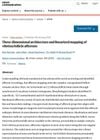 66 citations,
March 2019 in “Cellular and Molecular Life Sciences”
66 citations,
March 2019 in “Cellular and Molecular Life Sciences” Melanocyte development from neural crest cells is complex and influenced by many factors, and better understanding could help treat skin disorders.
 2 citations,
January 2004 in “Elsevier eBooks”
2 citations,
January 2004 in “Elsevier eBooks” Lupus affects the skin in various ways, and proper skin examination is crucial for diagnosis and treatment.
 3 citations,
April 2019 in “bioRxiv (Cold Spring Harbor Laboratory)”
3 citations,
April 2019 in “bioRxiv (Cold Spring Harbor Laboratory)” Beta-caryophyllene, found in essential oils, helps wounds heal better in multiple ways.
 January 2017 in “Springer eBooks”
January 2017 in “Springer eBooks” Scientists made working hair follicles using stem cells, helping future hair loss treatments.
 3 citations,
January 2021 in “Journal of Bioscience and Bioengineering”
3 citations,
January 2021 in “Journal of Bioscience and Bioengineering” Sweet potato shochu oil and its components may effectively promote hair growth.

Ganoderma lucidum extract may help treat stress-related hair loss.
 2 citations,
November 2022 in “Scientific reports”
2 citations,
November 2022 in “Scientific reports” Using gelatin sponges for deep skin wounds helps bone marrow cells repair tissue without scarring.
 April 2018 in “Journal of Investigative Dermatology”
April 2018 in “Journal of Investigative Dermatology” STIM1 is essential for sweat secretion.
 March 2024 in “Nutrients”
March 2024 in “Nutrients” Gynostemma pentaphyllum and its component damulin B could help hair grow by activating certain cell pathways.
 8 citations,
July 2022 in “BMC neuroscience”
8 citations,
July 2022 in “BMC neuroscience” Transplanted hair follicle stem cells improved brain function and reduced damage after a stroke in rats.
 February 2024 in “Frontiers in physiology”
February 2024 in “Frontiers in physiology” Hair follicle stem cells help skin heal and grow during stretching.
 411 citations,
April 2010 in “Gastroenterology”
411 citations,
April 2010 in “Gastroenterology” Targeting colon cancer stem cells might lead to better treatment results.
 2 citations,
April 2017 in “Molecular Medicine Reports”
2 citations,
April 2017 in “Molecular Medicine Reports” Blocking autophagy increases survival of inner ear hair cells exposed to gentamicin.
 January 2025 in “Nature Communications”
January 2025 in “Nature Communications” Large-scale reconstructions enhance understanding of vibrissal sensory mapping in the brain.
 76 citations,
March 2005 in “Journal of Molecular Medicine”
76 citations,
March 2005 in “Journal of Molecular Medicine” Certain mice without specific receptors or mast cells don't lose hair from stress.
August 2023 in “Stem cell reviews and reports”  June 2020 in “Journal of Investigative Dermatology”
June 2020 in “Journal of Investigative Dermatology” Scientists successfully grew mini hair follicles using human skin cells, which could help treat baldness.
 June 2020 in “bioRxiv (Cold Spring Harbor Laboratory)”
June 2020 in “bioRxiv (Cold Spring Harbor Laboratory)” Activating β-catenin increases melanocytes and decreases Schwann cells.
 121 citations,
March 1989 in “Journal of Investigative Dermatology”
121 citations,
March 1989 in “Journal of Investigative Dermatology” Minoxidil can help grow hair in mice by making cells grow and improving hair quality. More research needed.
26 citations,
February 2022 in “Journal of pineal research” Melatonin affects skin and hair color and protects skin cells, with potential benefits for hair growth and skin health.
 April 2018 in “The journal of investigative dermatology/Journal of investigative dermatology”
April 2018 in “The journal of investigative dermatology/Journal of investigative dermatology” miR-486 may help prevent hair loss in alopecia areata.
 8 citations,
September 2003 in “Journal of dermatological science”
8 citations,
September 2003 in “Journal of dermatological science” Substance P helps hair grow longer and faster.
1 citations,
December 2023 in “Life” PRP helps skin heal, possibly through special cells called telocytes.
August 2024 in “Bioorganic Chemistry” Cedrol from ginger can promote hair growth when taken orally.
 174 citations,
April 2005 in “The American journal of pathology (Print)”
174 citations,
April 2005 in “The American journal of pathology (Print)” Capsaicin, found in chili peppers, can slow down hair growth by affecting skin cells and hair follicles.
 April 2018 in “Journal of Investigative Dermatology”
April 2018 in “Journal of Investigative Dermatology” The keratin network in mouse skin changes during cornification and affects the skin's protective barrier.
 62 citations,
July 1993 in “Journal of Investigative Dermatology”
62 citations,
July 1993 in “Journal of Investigative Dermatology” Hair growth is influenced by interactions between skin layers, growth factors, and hormones, but the exact mechanisms are not fully understood.

Proretinal nanoparticles are a safe and effective way to deliver retinal to the skin.
 January 2024 in “Archives of pharmacy practice”
January 2024 in “Archives of pharmacy practice” The skin is vital for protection, temperature control, fluid balance, immunity, and sensing, with damage affecting daily life and mental health.
 1 citations,
December 2015 in “Endocrinology”
1 citations,
December 2015 in “Endocrinology” Decanoic acid may help treat PCOS by reducing androgen levels and improving glucose sensitivity.


























